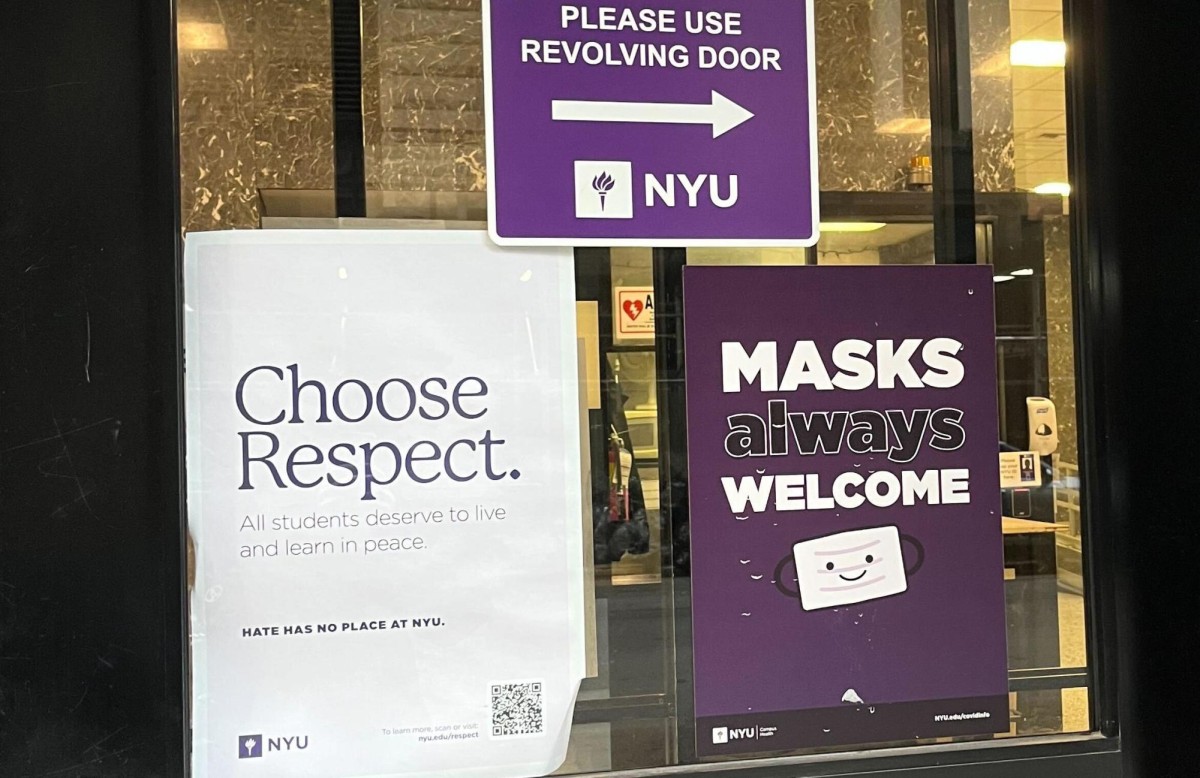As you walk around campus, you’ll now notice light purple posters plastered everywhere, all blaring one word: “Respect.” These posters are part of NYU’s latest campaign to address on-campus tensions due to the Israel-Hamas war, which has also included a series of emails, policy clarifications and on-campus programming. While the university’s efforts come as a much-needed reminder for mutual respect in times of turmoil, they don’t go far enough to address the charged atmosphere on campus.
One part of NYU’s “Respect | No Hate” initiative is the university’s 10 Point Plan, which outlines measures such as increased security, enforcement of conduct policies and various on-campus events aimed at improving student safety and well-being. While the initiative appears comprehensive on the surface, its stronger focus on disciplinary action compared to preventative measures fails to address the root of the problem.
“We hear that many are still upset, and many are looking for more ways to stop the hate they are witnessing,” President Linda Mills wrote in the 10 Point Plan. “And so are we.”
Recent events — like a student being caught tearing down posters of Israeli hostages on-campus, that same student being identified and harassed online, a student engaging in a physical altercation with another student during a pro-Israeli sit-in at Bobst Library or students facing antisemitism to a point where they chose to sue the university — show that this campaign isn’t actually encouraging students to keep each other safe.
Instead of providing guidelines for how to approach discussions on the war in a productive way, or providing spaces for these discussions throughout departments and schools, the university has doubled down on discipline. Consequences are important, sure, but why not put a greater focus on preventing problematic conduct in the first place?
The university’s existing efforts to foster a respectful environment are overly passive. With the posters, for example, each one has a QR code linking to universitywide resources, the Bias Response Line, the Department of Campus Safety and safe spaces. However, students don’t necessarily take the time to engage with posters they may not even notice on their way to class.
On the other hand, the university has sent multiple emails emphasizing its conduct policies, as well as a plethora of statements condemning various incidents on campus related to the war. If NYU wants to get serious about promoting safety and respect, the university needs to provide resources to students with at least the same energy it has used to criticize them.
Recently, the university released a report where it revealed that it has reviewed more than 90 conduct cases since the start of the Israel-Hamas war. It also disclosed that students have faced multiple forms of disciplinary action, including “significant suspensions.” This number of cases is concerning, and is evidence that NYU’s current approach to the conflict is failing to get ahead of misconduct. While some students might learn from disciplinary action, preventing misconduct through education and university-sponsored opportunities for respectful discussion is a much more proactive alternative.
Whatever parts of the current plan are aimed at fostering respectful debate are overshadowed by policies that censor conversation. Student efforts to share their opinions respectfully have been largely thwarted by university efforts like closing the staircase at the Kimmel Center for University Life — which has historically been a gathering spot for students in times of conflict and tragedy — or the alleged cancelation of pro-Palestinian events.
The lack of university-sponsored events regarding the Israel-Hamas war, as compared to the many events held to discuss the Russia-Ukraine war, also reveals that NYU is not prioritizing education and discourse in the face of the conflict in Gaza. Not only does the university have access to experts and scholars that could help educate the student body about the war through events, it also has the opportunity to organize town halls and meetings for open, candid student dialogue. This passive approach to the conflict has only served to fuel misunderstanding, hatred and polarization on campus.
While it’s encouraging to see QR codes linking to universitywide resources every time I enter an NYU building, they should not be the only visible effort to foster respect from the university. They should instead supplement efforts to educate and listen to the student body that make it easier for students to discuss painful and complex topics with one another. NYU’s current approach of passive messaging, restricting free speech and focusing on discipline is not the solution to the current campus environment.
WSN’s Opinion section strives to publish ideas worth discussing. The views presented in the Opinion section are solely the views of the writer.
Contact Abi Rivera at [email protected].






















































































































































